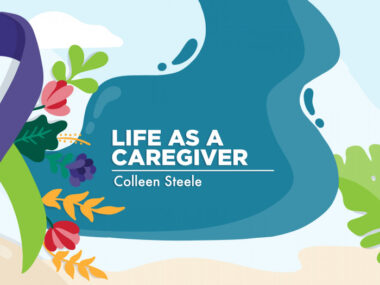Don’t judge a biker by his cover: A tribute to family caregivers
Giving thanks for the love and support of my husband and daughter
Written by |

If you saw my husband, Manny, on the street, you might think he looks angry or even a little intimidating. With his love for Harleys, T-shirts, and plaid, he fits the biker persona well. But what you can’t see is the immense heart of the man who has been my rock for more than two decades. You can’t see the countless nights he’s spent awake, watching me breathe, terrified that if he closes his eyes, I might stop breathing.

Manny Cueva, on one of his rides with the guys, enjoys a much-needed break from caregiving. (Courtesy of Manny Cueva)
As we approach November’s National Family Caregivers Month, I am overwhelmed with gratitude for the goofy, loud, and incredibly loving man God placed in my life. Living with a rare disease like pulmonary hypertension (PH) is not a solo journey. While I recently shared some positive updates about a new treatment I’m taking, I’m always reminded that it takes a village. My family caregivers are the foundation of that.
The role of a family caregiver is one of quiet strength and unseen sacrifices. The emotional, mental, and physical toll is immeasurable. They are the ones who see us at our absolute worst. They absorb our frustration, fear, and pain on our most difficult days, often getting the brunt of our struggles. It’s a role that isn’t celebrated nearly enough.
My beautiful daughter, Kayla (whom I call “KK”), stepped into this role far too early. I carried a heavy guilt for years, feeling she was cheated out of parts of her childhood because of my PH diagnosis. However, as she grew older, she assured me she never felt that way. Instead, she remembers the quiet moments we shared, watching “Gilmore Girls,” napping together, and having chill days that brought us closer. Her childhood may have been different from many others, but it was filled with a unique kind of love and connection.
As a caregiver, Kayla often had to take on more responsibilities than a typical child her age. She would help with household chores, run errands, and even accompany me to doctor’s appointments. Despite the challenges she faced, Kayla always maintained a positive attitude and showed unwavering love and support.
Thoughts from my amazing caregivers
To celebrate family caregivers, I spoke with Manny and Kayla about their experiences. Here’s what they shared:
When I asked Manny what makes him feel most appreciated, he mentioned the small gestures — specifically when I thank him for the little things he does with bright, colorful Post-it notes that I often tuck into his lunch bag.
Regarding caregiver self-care, Manny acknowledged, “It’s a balancing act, as we all have our own inner battles with numerous things in life. I will not lie, it is very difficult at times, but my Jen always reminds me to do better for my own health, also.” His best advice for other caregivers echoed this sentiment: “You must take care of yourself and take time for yourself.”

From left, Jen Cueva and her daughter, KK, enjoy a Mother’s Day brunch. (Courtesy of Kayla Cueva)
Reflecting on her own experience as a family caregiver, Kayla said:
“Caring for someone who has shown you unconditional love often feels natural, but it’s not without its challenges. There are tough moments — times when you question if you’re doing enough or wish you could be more present. On those days, I draw strength from my mom’s resilience and the way she has always given so much of herself to others.
“Prioritizing self-care has become essential for me. Whether it’s going to the gym, meditating, attending therapy, or even taking a quick getaway, these moments help me recharge. One of the best pieces of advice I’ve ever received is to call my mom every day. In the midst of life’s busyness, those small moments of connection remind me that caregiving can take many forms. It’s about presence, support, and showing up, even if it’s as simple as sending her what she needs through DoorDash when I can’t be there in person.”
To Manny, Kayla, and every family caregiver out there: We see you. We know the weight you carry. The love and support you provide add a quality to our lives that no medicine can replicate. You are our anchors in the storm of rare disease.
But we also worry about you. It’s crucial to remember that you cannot pour from an empty cup. The constant demands of caregiving can drain you. Please take breaks. Find moments for yourself, whether it’s a quiet walk, a coffee with a friend, or simply time to sit in silence. Your well-being is not a luxury; it’s a necessity.
Taking care of yourself is not selfish. It is the most important thing you can do to continue being the incredible support system we rely on. Thank you for your endless love, your tears, and your unwavering presence. You are our heroes.
How do you celebrate your family caregivers? I would love to hear your thoughts in the comments below.
Note: Pulmonary Hypertension News is strictly a news and information website about the disease. It does not provide medical advice, diagnosis, or treatment. This content is not intended to be a substitute for professional medical advice, diagnosis, or treatment. Always seek the advice of your physician or other qualified health provider with any questions you may have regarding a medical condition. Never disregard professional medical advice or delay in seeking it because of something you have read on this website. The opinions expressed in this column are not those of Pulmonary Hypertension News or its parent company, Bionews, and are intended to spark discussion about issues pertaining to pulmonary hypertension.




Jolie Lizana
We share something in common: having a child who grew up as a caregiver. Regardless of whether you asked them to be or not, it just happens. They take care of us when we're ill, and I'm too worried that my son missed out on so much or had too much on his plate at such a young age. I tried to take it off his plate, but he wasn't having it. haha
It's amazing how close he and I are, thanks to all the times we shared curled up in blankets on the sofa, talking for hours. There's a closeness that transcends time and space. It's funny how we are "tragically blessed".
Thank you for sharing your story. It's beautiful!